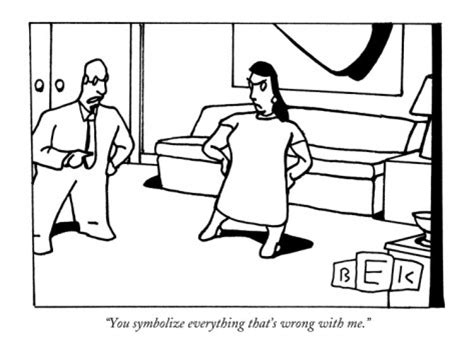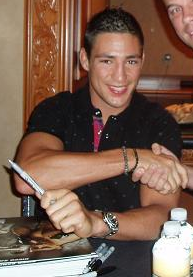A Quote by Bruce Eric Kaplan
It was memorable the first time 'The New Yorker' bought a cartoon from me. I had been sending them batches for years every week, and they didn't respond to them.
Related Quotes
'Royal Beatings' was my first story, and it was published in 1977. But I sent all my early stories to 'The New Yorker' in the 1950s, and then I stopped sending for a long time and sent only to magazines in Canada. 'The New Yorker' sent me nice notes, though - penciled, informal messages. They never signed them. They weren't terribly encouraging.
The first time I went to New York, I went with my first boyfriend, Clark. His dad had just bought an apartment in New York, and my dad dropped us off, and we were there for a week on our own. I must have been 15 or 16. I remember I went to Harlem and bought a goose jacket. That was the hip, hot thing.
Every step in human progress, from the first feeble stirrings in the abyss of time, has been opposed by the great majority of men. Every valuable thing that has been added to the store of man's possessions has been derided by them when it was new, and destroyed by them when they had the power. They have fought every new truth ever heard of, and they have killed every truth-seeker who got into their hands.
For most visitors to Manhattan, both foreign and domestic, New York is the Shrine of the Good Time. "I don't see how you stand it," they often say to the native New Yorker who has been sitting up past his bedtime for a week in an attempt to tire his guest out. "It's all right for a week or so, but give me the little old home town when it comes to living." And, under his breath, the New Yorker endorses the transfer and wonders himself how he stands it.
I had someone call me this morning telling me they had somebody who would only work a certain number of hours a week because if they worked too many hours a week then they couldn't get their government assistance. And that person has multiple cell phones, and gets them new every month with new minutes.
I cracked a child prostitution ring - I'd worked with three vice cops every day for months, out on the street, in the cold, trying to track down the pervs and the young girls being prostituted.We finally got the convictions.Six or seven months later, I was working, and I glanced up at the TV, and it was a report on a federal case.It was all three of them, in federal court, in handcuffs. Every time they busted a drug lord or a doper, they'd take all their money and their jewelry and flat screens before sending them to jail. They had been stealing from dopers for years!
Clay Felker was then - he had - to his credit, he had created New York Magazine, which was the first of the city magazines that covered the city and gave all kinds of advice and all that sort of stuff. And there were copies all over the country by the time he left. He had, however, a view of journalism that was very much, I must say, like Tina Brown's at The New Yorker. You hit 'em hard, fast, give 'em something to talk about the day after the paper comes out, as contrasted with William Shawn, who gave them something to talk about two or three years from then.
I took part in a theatre festival in Massachusetts two summers after I graduated from college. Then I was in Los Angeles thinking: "I'm going to go to New York." I'd decided that I would not have a chance of a film career, so I was about to make the move. I bought a plane ticket and found a place to live in New York, packed my bags and of course the universe "told me" that I was not meant to go. Suddenly, a week before I was supposed to leave, I had three job offers and one of them was my first movie.
[...] He didn't want his wife to read historical romances because it might give her unrealistic expectations. [...] If I had been him, I would have been reading your books every time you laid them down to see how I could improve my skills and please you. Second warning of the night. I bought a couple." You bought a couple of what?" Historical romances. I'm three-quarters through the first one." He flashed her a slow grin. "All I can say is, I like the way your mind works." ~Jake Coulter and Molly Wells


































